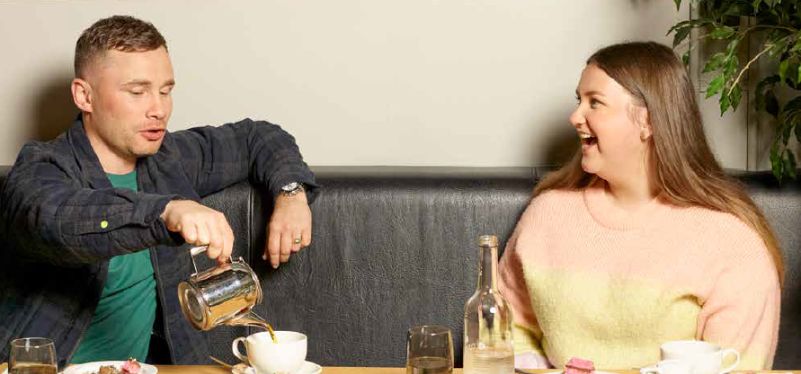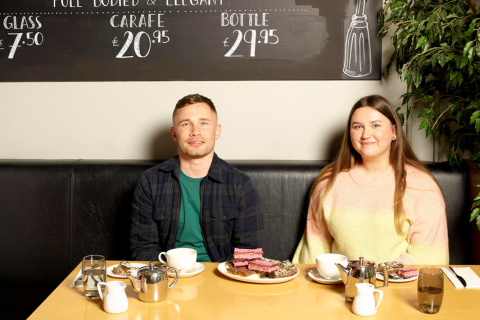Let's go eat cake!
Carl Frampton, two-weight former world champion boxer, and second year Aoife Major find they have more in common than just a sweet tooth.

The worlds of boxing and psychology might not seem to have much in common. But as two-weight former world champion boxer Carl Frampton and second year psychology student Aoife Major sit down to chat over tea and traybakes at Deane’s at Queen’s, Frampton is eager to know Major’s thoughts on sports psychology. “It’s fascinating, and that’s why I love the subject – there are so many fields and so much to explore,” says Major.
Frampton remembers when he first started as a boxer, sports psychology wasn’t taken too seriously. “But I sought out an expert when I was having a turbulent time in the last three or four years of my career, and he put me back on track. It used to be, if you said you were speaking to a sports psychologist, you’d be asked what was wrong with you. It was seen as a weakness. But now, all the top athletes in the world will be speaking to one.”
They move on to discussing the importance of good mental health, in the ring and in the classroom: Frampton supported the recent Charge Up Get Connected campaign, aimed at improving men’s mental health at Queen’s. “I was pleased to find there’s a lot of awareness and support for mental health here,” says Major.

And the two have a lot more in common, it transpires. Major and Frampton are from North Belfast: Major moved there when she was 10 and went to Blessed Trinity College, where she ended up as head girl, while Frampton hails from Tiger’s Bay. They both decided on a path early in life. Frampton dedicated himself to boxing at seven, which was, he says, “probably too young. I was always in and out of the New Lodge and the Falls Road, training and fighting. But I never experienced the kind of animosity that other kids had, because of sport. I was single-minded and driven and I knew what I wanted to do.”
Major took the academic route, inspired by a relative who went to Queen’s. “That was the first time I thought about Queen’s as being for someone like me,” she says. “Then I got on the Pathway Opportunity Programme (POP), and I never wanted to go anywhere else.” POP gives students, no matter what their background, the opportunity to come and study at Queen’s. “There are so many benefits – you get a bursary and grade reductions,” says Major. “And it really helped when I applied. There’s a lot more to applying to Queen’s than just your marks.”
Frampton has been involved with POP since he received an honorary degree from Queen’s in 2019, awarded for distinction in sport. “It was a proud moment for me. I felt a wee bit out of place, though, sharing my day with people who had worked really hard at school! Schemes like POP are so important. I think people from Belfast sometimes see Queen’s as out of their league – it’s great the University is trying to change that.”
So, what’s the secret of these two self-starters who have worked hard to achieve their goals? Frampton remembers almost giving up in his late teens when he was beaten in the Irish Championships by a boxer whom he knew he should have beaten. “I was 18 or 19 and wasn’t putting enough effort in.” He thought about giving up but his then girlfriend (now wife), Christine, and his family persuaded him to stick at it. He went to work, drew the same boxer the next year and beat him convincingly.
“It’s all about resilience, isn’t it?” says Major. “I’m determined to study for a Master’s once I finish my degree, and then enter clinical psychology and research. For me, it’s about putting myself out there. I’ve always tried to be confident and just push myself forward.”
GET INVOLVED For more, visit qub.ac.uk/alumni/PathwayOpportunityProgramme